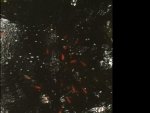- Joined
- Mar 22, 2014
- Messages
- 12
- Reaction score
- 0
Hi there.
I have a fairly large, deep pool to pond conversion in Sydney Australia. Plenty plants, a pump to give flow and a solar aerator. I have about 25 Comets and Subunkin that have been in for about four months now and always came to the suface to feed and could often be seen having fun around the pond all in one big gang. There is only visibility for the first couple of feet, then the tanins and algae make it dark, which I do not mind at all. There are trees all around the pond, so undoubtably leaf material build up on the bottom.
It recently rained heavily and non stop for over two weeks here and the temperature was low as it was winter (but well above freezing), since then I have hardly seen any of the fish.
For two whole weeks I saw non at all. For the last two weeks I have seen a group of five and two individuals. No bodies have floated to the surface. I have tested the water, no problems in nitrates or ph.
Where have they gone?
a) most died after some agent was washed in?
b) they have decided that the deep plants and leaf mould is nicer than the cheap fish food I give them?
c) they were freaked out when I tried to scoop lots of leaf mould up and have never forgiven me?
I would really appreciate any help and ideas you wonderful people have!
Nick
I have a fairly large, deep pool to pond conversion in Sydney Australia. Plenty plants, a pump to give flow and a solar aerator. I have about 25 Comets and Subunkin that have been in for about four months now and always came to the suface to feed and could often be seen having fun around the pond all in one big gang. There is only visibility for the first couple of feet, then the tanins and algae make it dark, which I do not mind at all. There are trees all around the pond, so undoubtably leaf material build up on the bottom.
It recently rained heavily and non stop for over two weeks here and the temperature was low as it was winter (but well above freezing), since then I have hardly seen any of the fish.
For two whole weeks I saw non at all. For the last two weeks I have seen a group of five and two individuals. No bodies have floated to the surface. I have tested the water, no problems in nitrates or ph.
Where have they gone?
a) most died after some agent was washed in?
b) they have decided that the deep plants and leaf mould is nicer than the cheap fish food I give them?
c) they were freaked out when I tried to scoop lots of leaf mould up and have never forgiven me?
I would really appreciate any help and ideas you wonderful people have!
Nick


